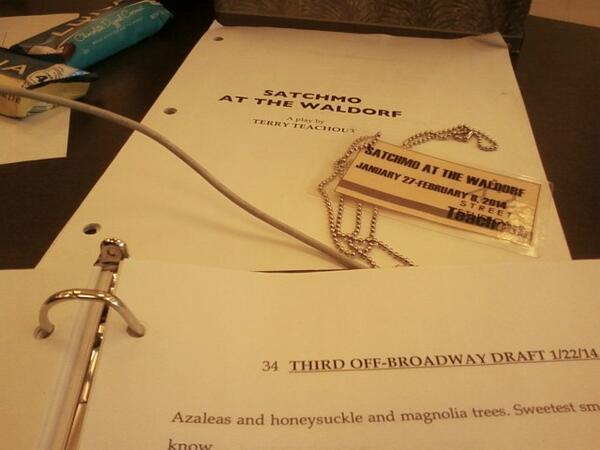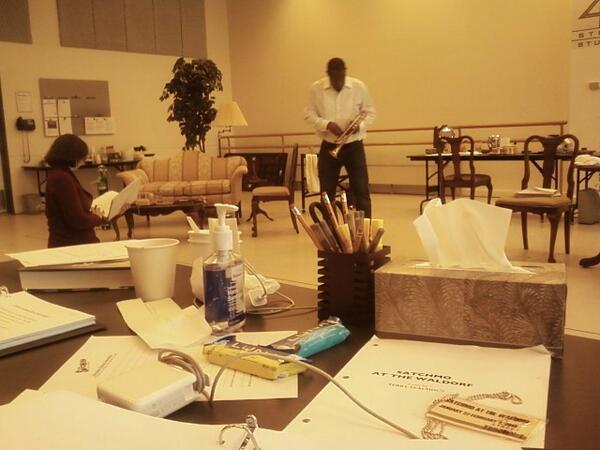“Like many men who always see two sides to a question, he loved to discharge his conscience by leaning on the counsel of those who saw only one.”
Ronald Knox, Barchester Pilgrimage
Archives for February 2014
TT: Lookback
From 2004:
All of which leads me to ask: is the performance of classical music an intellectual activity? Did the breadth of Glenn Gould’s culture make him a better interpreter of Bach? I wonder. I’ve known a lot of musicians in my time, some of whom were damned smart and some of whom were (ahem) less so, and I rarely noticed any clear-cut relationship between what went into their heads and what came out of their fingers or mouths. (In my more limited experience, the same is true of dancers and painters.) I’m not saying that a stupid person can become a successful musician, but I’m not so sure that having read T.S. Eliot equips you to play Beethoven’s Op. 111 well….
Read the whole thing here.
TT: Almanac
“Like many men who always see two sides to a question, he loved to discharge his conscience by leaning on the counsel of those who saw ony one.”
Ronald Knox, Barchester Pilgrimage
On your mark
 I arose at four a.m. last Tuesday and flew from Florida to New York to take part in a “straight six” rehearsal (six hours, no lunch break) for Satchmo at the Waldorf. It was forty degrees colder in Manhattan than in Orlando, and the cabby who picked me up at the airport was puzzled by the fact that I’d chosen to come north.
I arose at four a.m. last Tuesday and flew from Florida to New York to take part in a “straight six” rehearsal (six hours, no lunch break) for Satchmo at the Waldorf. It was forty degrees colder in Manhattan than in Orlando, and the cabby who picked me up at the airport was puzzled by the fact that I’d chosen to come north.
“You in town on business?” he asked.
“I’m here to rehearse a play,” I replied.
“Huh. So, what are you? The director?”
“Writer.”
I said it casually–or tried to–but it still felt to me as though trumpets were playing a fanfare somewhere in the distance.
 We’re working at the New 42nd Street Studios, next door to the American Airlines Theatre, where I saw the Roundabout Theatre Company’s revival of Machinal a couple of weeks ago. “What production, sir?” the man at the front desk asked, then handed me a laminated Satchmo at the Waldorf studio pass. I took the elevator to the seventh floor, noticing as I got off that Aladdin, the new Disney musical, is being rehearsed next door in the Jerome Robbins Studio. A plaque on the door to our space, the Mike Ockrent Studio, bore the following motto: REHEARSAL IS THE BEST PART.
We’re working at the New 42nd Street Studios, next door to the American Airlines Theatre, where I saw the Roundabout Theatre Company’s revival of Machinal a couple of weeks ago. “What production, sir?” the man at the front desk asked, then handed me a laminated Satchmo at the Waldorf studio pass. I took the elevator to the seventh floor, noticing as I got off that Aladdin, the new Disney musical, is being rehearsed next door in the Jerome Robbins Studio. A plaque on the door to our space, the Mike Ockrent Studio, bore the following motto: REHEARSAL IS THE BEST PART.
I guess it’s for keeps this time, I said to myself. Then I took a deep breath, walked in, and said hello to everybody. A few minutes later we were off and running, and a few more minutes after that I was swept up once again in the all-consuming process of staging a play.
What happens in a rehearsal hall stays in a rehearsal hall, but I can tell you that everything is going smoothly, just as it has ever since Gordon Edelstein, John Douglas Thompson, and I started working on Satchmo in 2012. I’ve added four short scenes to the script since the play was last performed in Philadelphia, three musical sequences and a new speech. This was the first time that I’d seen them acted, and they all looked and sounded convincing. In addition, I rewrote on the spot another bit that had long given us trouble, feeling as I did so just like…well, like a professional playwright.
 After rehearsal I grabbed a bite to eat, then went to the Samuel J. Friedman Theatre to see Outside Mullingar, John Patrick Shanley’s new play. The next day I flew back to Florida and Mrs. T. We dined on leftovers and watched Tootsie, which opens with a montage of scenes from unsuccessful auditions at which Dustin Hoffman’s character fails to get the part. Not surprisingly, this sequence is much more meaningful to me today than when I saw Tootsie in the theater thirty-two years ago. (Incidentally, I stole one of Joe Glaser’s lines in Satchmo at the Waldorf from Tootsie. So far, nobody’s noticed.)
After rehearsal I grabbed a bite to eat, then went to the Samuel J. Friedman Theatre to see Outside Mullingar, John Patrick Shanley’s new play. The next day I flew back to Florida and Mrs. T. We dined on leftovers and watched Tootsie, which opens with a montage of scenes from unsuccessful auditions at which Dustin Hoffman’s character fails to get the part. Not surprisingly, this sequence is much more meaningful to me today than when I saw Tootsie in the theater thirty-two years ago. (Incidentally, I stole one of Joe Glaser’s lines in Satchmo at the Waldorf from Tootsie. So far, nobody’s noticed.)
I spent Tuesday evening with a new friend, a singer who hails from a very small town very far from New York. While my friend loves her new home, she confessed to me over dinner that she’d been feeling a bit blue of late, mainly because of the horrific difficulties facing any performer who tries to make her way in a place like this at a time like this. “I’ve been doing pretty well for myself,” she said, “but the longer I live here, the more I feel like singing ‘Is That All There Is?'” But then we ate our meal and strolled across the street to see our show, and the next day she sent me an e-mail that read as follows: “Thank you for such a delightful evening. You helped me remember how magical New York City can be.”
I knew exactly what she meant, because I’d been thinking much the same thing all day long. Sometimes living here is like sticking your head in a pencil sharpener and turning the handle yourself, and there are plenty of days when I mutter Damn this place anyway! and start trying to figure out how to get the hell out of town for good. Yet there are also the times when a security guard says “What production, sir?” and hands me a badge with the name of my first play printed on it, and I find myself whistling a different tune in a major key.
Love it or hate it–or, just as likely, both–there’s no place in the world like the theater district of New York. Especially when you’ve got a show coming in.
* * *
Gene Kelly, Jules Munshin, and Frank Sinatra sing “New York, New York,” by Leonard Bernstein, Betty Comden, and Adolph Green, in the 1949 film version of On the Town:
Just because: Julian Bream plays Villa-Lobos
Julian Bream plays Villa-Lobos’ Choros No. 1 in E Minor:
(This is the latest in a series of arts-related videos that appear in this space each Monday and Wednesday.)
Almanac: Alec Guinness on fools
“I neither suffer myself, nor other fools, gladly.”
Alec Guinness, A Commonplace Book
TT: Just because
Julian Bream plays Villa-Lobos’ Choros No. 1 in E Minor:
(This is the latest in a series of arts-related videos that appear in this space each Monday and Wednesday.)
TT: Almanac
“I neither suffer myself, nor other fools, gladly.”
Alec Guinness, A Commonplace Book
